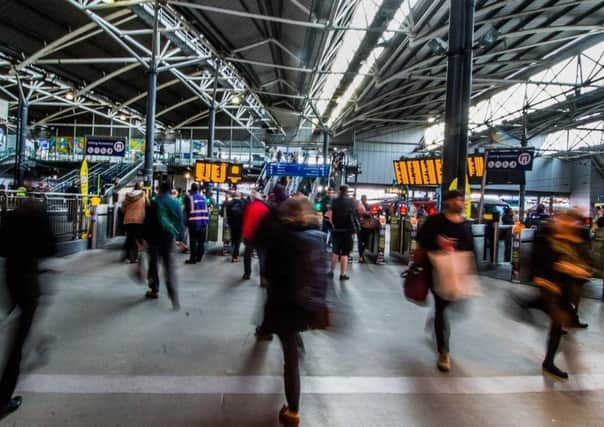Greg Wright: The business case for free wi-fi on every train


When you’re not being squeezed like a sardine inside cramped, dated carriages, you are being driven to distraction by a wi-fi system that can be wayward or simply non-existent.
The adverts from the 1980s which depicted the commuter of the future settling into a plush seat, kicking off their shoes and enjoying a happy, productive journey have turned out to be a horrible parody.
Advertisement
Hide AdAdvertisement
Hide AdIn an ideal world, a train journey should be the safest and most productive way of getting around. You should have the opportunity to work from your seat – assuming you are lucky enough to get one – because it allows you to use your time as efficiently as possible.
As a businessman told me the other day, we must start from the premise that there should be free and ubiquitous wi-fi on all our trains and buses. Anything less is totally unacceptable.
The current system is betraying hundreds of thousands of commuters who deserve much better. According to figures issued by Global Wireless Solutions (GWS), almost a third of attempts to connect to the internet on trains fail. Given that 1.7 billion journeys are made each year on our railways, this lack of connectivity equates to millions of productive hours lost.
Jamie Martin, managing partner of law firm Ward Hadaway, is one of a growing number of business leaders who believes the North would become more productive if commuters had reliable access to wi-fi on trains. I’ve been inundated with messages from the owners of businesses of all shapes and sizes who have been angered by the woeful standard of connectivity on the train system.
Advertisement
Hide AdAdvertisement
Hide AdCompany director Mark Mitchell described his train journey into Leeds from Harrogate as a nightmare for connectivity.
He said: “There are a couple of major blackspots on the train line. I moved back to the UK from living in Thailand a few years ago, when I travelled the country over there I never got blackspots in 4G. It amazes me that this exists in the UK in 2018. It used to really frustrate me until I just wrote off trying to work on the train completely.”
Businesswoman Fiona Stygall, who is a frequent traveller through Leeds station, is another unhappy commuter.
She said the station’s mobile coverage is always totally overwhelmed at rush hour.
Advertisement
Hide AdAdvertisement
Hide AdShe said: “Given the vast numbers of people travelling through every day, it’s inexcusable that there’s no public wi-fi. There are only small private coverage areas that require you to sign up to mailing lists. Two years ago I was living in London, and could use wi-fi in almost every station I regularly passed through.”
These digital blackspots are widening the economic divide between Yorkshire and the South-East. To put it bluntly, Yorkshire has become less productive because our brightest and best workers waste hours trapped inside a lumbering train system which lacks access to the ebb and flow of the digital world.
The Government’s Digital Strategy, which was announced last year, includes a commitment to improve technology on public transport.
But action is needed now. Improving wi-fi connectivity on train journeys between the major Northern cities would provide businesses with access to the skills, services and labour they need to beat their competitors in the South-East.
Advertisement
Hide AdAdvertisement
Hide AdFewer people should have to endure the frustrations experienced by Bethan Vincent, a marketing manager, who frequently makes the 90-minute journey from York to Manchester via rail without wi-fi.
She said: “I am constantly having to weigh up the working time I will lose against the gains I will make by visiting our Manchester office.
“To make the trip for a day I will lose three hours of time that could be spent collaborating with my team or responding to emails. I work in tech, so it’s very hard to be productive offline.”
If countries like Thailand can provide seamless coverage on its rail network, why can’t the UK get its act together?
Advertisement
Hide AdAdvertisement
Hide AdIn fairness, some of my contacts have described the wi-fi as “not too bad” on the East Coast Main Line and many of the major network operators have installed masts near the main railway routes, although their efforts are often foiled by tunnels and cuttings.
Once your train heads off into rural Yorkshire it can, alas, become a real struggle to make a quality voice call or access the internet. Perhaps the only thing that could force our sluggish train wi-fi system to spring into life would be the threat of terrorism or war.
This perspective was provided by businesswoman Julia Kay, who said the wi-fi system in Israel is world-class, because the country has to be super-connected in case it comes under attack. She said: “Every bus, train and coffee shop has wi-fi and somewhere to charge your phone. There is also “street” wi-fi widely available. The business benefits are considerable.”
It’s a chilling prospect, but it may be that only the prospect of conflict or terrorism can shake Britain out of its terrible digital complacency.
Greg Wright is deputy business editor of The Yorkshire Post.